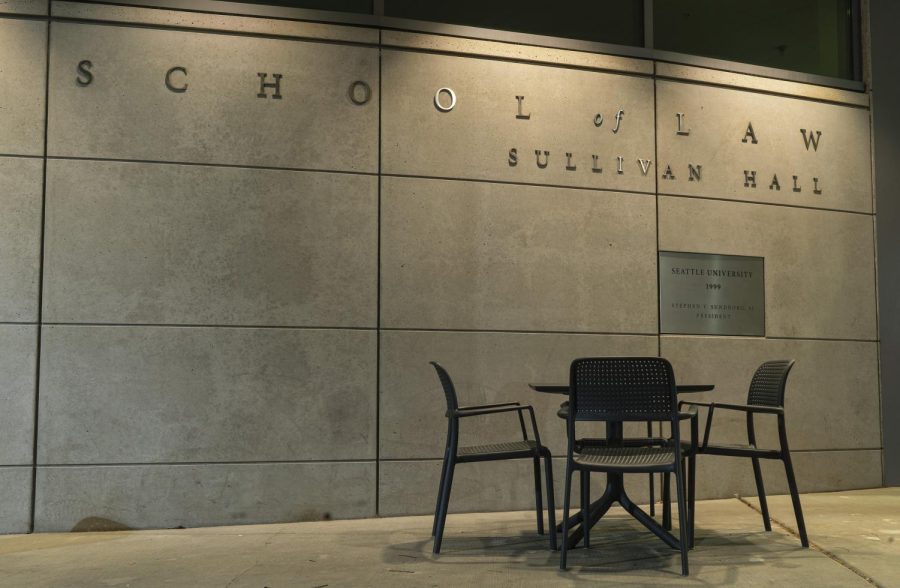Seattle U Law School Hosts Teach-In Surrounding Police Brutality
The aftermath of the murder of Tyre Nichols by five members of the Memphis Police Department sparked renewed discussion surrounding police brutality against Black communities. The Seattle University School of Law engaged in discourse by hosting a Teach-In at Sullivan Hall with a distinguished panel of law personnel Feb. 1. All speakers on the panel provided unique insight regarding discrepancies between legal and social views of police brutality.
The Teach-In was dedicated to Nichols, a 29-year-old Black man from Memphis, Tenn. who died Jan. 10 during a routine traffic stop. Seventeen days later, footage of Nichols’ interaction with five officers of the MPD was released. The video shows two officers pulling Nichols from his car as other officers join in yelling obscenities and threats of physical violence at Nichols. One officer can be heard saying “I hope they stomp his ass.” The 25-minute video depicts officers restraining Nichols while carrying out various violent attacks.
The results of the independent autopsy commissioned by Nichols’ family were made public Jan. 23. Nichols’ official cause of death was ruled as “extensive bleeding caused by severe beating.” The ensuing investigation led to the arrest of five officers who have all been indicted on charges of second-degree murder: Desmond Mills Jr, Demetrus Haley, Emmett Martin III, Justin Smith and Tadrius Bean.
Assistant Law Professor at the University of Washington, David Owens, began the Teach-In by focusing on the renewed presence of activism that gained traction in 2020 after the death of George Floyd as well as the optimistic results of protests nationwide
“I saw some things I never thought I’d see. I saw thousands and thousands of white people marching by my house in Beacon Hill. Then, the Washington State Legislature passed so many bills strongly opposed by the police,” Owens said during the event.
Although 2020 promoted change and social uprising against police brutality across the nation, the disconnect between African American communities and the police remains. PBS reported that two thirds of African American men in America don’t trust the police to treat them fairly in comparison to their white counterparts.
A key change in the relationship between the public and law enforcement is the availability of body camera footage.
“Now there are videos, and with that, Black suffering is thrust into the limelight and becomes this spectacle that everyone watches and talks about. But what happens when there is no victim on video?… It is exhausting to see the spectacle of Black suffering play out and the emotional infrastructure involved in dealing with the lack of humanity involved,” Owens said.
James Bible, a civil rights attorney who served as former president of the National Association for Advancement of Colored People in King County, then addressed the legal realities that make it challenging for victims of police brutality to actively pursue and receive justice from legal systems.
“We found a video of a young kid who was thrown to the ground, repeatedly punched in the stomach and kicked on the side and then tased by five officers. It looked like Rodney King and Tyre altogether… but it didn’t stop the prosecution from charging that young man with assaulting a police officer,” Bible said during the event.
The idea that the criminal justice system actively works to protect police officers over the victims on all levels was a theme of the Teach-In. The speakers made it clear that displays of police brutality aren’t only a problem in the South. In March, 2020, Manuel Ellis, a man from Tacoma, Wash., was killed while being choked and hogtied by Pierce County police. The two officers involved with the incident were exonerated of any wrongdoing. The Seattle Police Department has been under federal oversight since 2012 in part due to repeated violations involving use of excessive force.
“It is not just St. Louis or Ferguson. [It’s] not just in Minneapolis or Memphis. It’s here,” Robert Chang, a law professor who serves as executive director of Fred T. Korematsu Center for Law and Equality, said during the event.
The event was closed out by Dean Spade, a professor of law at Seattle U, who addressed the progress that the Seattle community has made over the years and what steps citizens can take to actively combat the presence of police brutality in their communities.
“It’s important for people to have a sense of clarity when examining these situations. In the last couple of years there has been exhaustion with recurring deaths in communities and ineffective reforms that continue the violence our communities want to stray from,” Spade said during the event.
The Teach-In provided significant insight for students, faculty and staff on the existence of police brutality locally and nationally. Those in attendance were called upon to make a difference in their local communities and continue to educate themselves on the shortcomings of law enforcement as well as look optimistically to the future.


